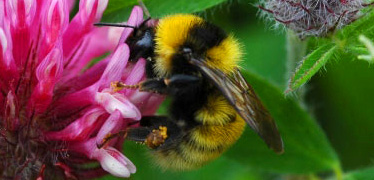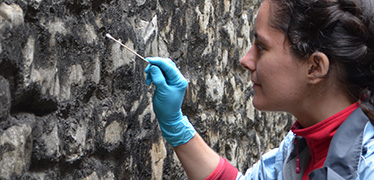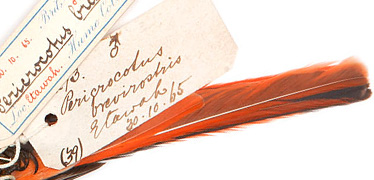
Max Barclay, Museum Coleoptera collection manager and species identification specialist, at work
Species identification experts are a rare breed, but the Museum has a plan to train new specialists for the future.
The UK’s plants and animals have never been under greater threat from environmental change and habitat loss. At the same time, critical skills for identifying organisms have been waning, hampering much-needed monitoring and conservation efforts.
Fortunately scientists in the Museum’s Angela Marmont Centre for UK Biodiversity have designed a new work-based traineeship called Identification Trainers for the Future, which aims to pass on the complex skill of species identification to the next generation.
The project is funded by a grant from the Heritage Lottery Fund’s Skills for the Future programme and is being delivered in partnership with the Field Studies Council and the National Biodiversity Network Trust.
The Museum is the ideal venue for the course because it has world-leading experts in species identification, along with fantastic specimen collections and training facilities.
Project manager Stephanie West explains:
'The decline in identification skills is particularly true for some of the harder-to-reach groups, some of the more complex taxa. Groups like true flies and earthworms are often overlooked but vitally important to ecosystems.'
A dying breed
The species identification specialist is an endangered expert and increasingly this is being recognised across the ecological sector and beyond.
In 2010, the Museum led a NERC-funded review of the current status of taxonomy and systematics within the UK. The review highlighted serious concerns over the training and recruitment of the next generation of taxonomists.
More recently, The Chartered Institute for Ecology and Environmental Management (CIEEM) stressed the effects that declining skills in species identification are having on the professional ecology sector within its 2011 publication Ecological Skills: Shaping the profession for the 21st Century. West agrees with the institute’s bleak findings:
‘Our most highly skilled species identifiers and taxonomists are often amateurs and many of them are at, or beyond, retirement age. Younger ecologists are leaving universities with great qualifications but without the detailed knowledge of a true specialist. Expertise of course can only come with time and perseverance, but often graduates leave university with very little idea of how to start developing their skills in this area and very little exposure to field recording. We want to help turn this situation around via our traineeship scheme.’
Saving precious habitats
The species identification skills gap is having a big impact on valuable habitats, ecosystems and biodiversity in the UK. For example, identification experts often act as ecological consultants - assessing the biodiversity value of land earmarked for development.
The results of these consultations can often save a precious habitat, but West thinks the current skills gap and lack of experience in species identification can result in the loss of valuable sites.
‘The land can have value to biodiversity that is easy to miss if you do not know what you are looking for. There was one site I worked on where a high value acidic grassland was completely missed because the previous ecological consultancy did not recognise the particular species indicating the quality of the habitat. By identifying the grassland we were able to ensure the habitat was retained and enhanced through the development plans’.
Species-rich lowland acidic grasslands are declining throughout the UK due both to increasing urbanisation and agricultural activity.
Their classification relies on the identification of certain indicator species within the sward (an expanse of short grass) and they are also important ecosystems supporting a diverse range of specialist wildlife.

Museum scientist inspecting botanical specimens on the Isles of Scilly
A special passion
As part of the project, the Museum will be offering 15 work-based traineeships over three years, training five students each year.
West explains what is expected of each candidate:
‘We are looking for very motivated individuals, passionate about UK wildlife with the drive to become genuine experts.’
The traineeships are designed to do more than train a select group of individuals though. The project also aims to turn its trainees into trainers themselves, ready to pass on their skills through public outreach and the development of identification guides and toolkits.
Training materials produced throughout the project will be made freely available to all and will be targeted at a range of interest groups, from beginners to experienced experts who are looking to further develop their skills.
Plenty of amateur experience including involvement with national recording schemes and the ability to articulate concepts to others will help any applicant towards a place on the course.
West is keen to point out that if a candidate has the passion and a flair for the subject it doesn’t matter if they have a degree or not.
‘We are looking for people with an underlying passion for species identification and who want to make it their career,’ she says.
The Museum is investigating options to develop professional accreditation for identification skills. If successful, this will help to demonstrate and quantify identification expertise across the professional UK biodiversity sector.
Future direction
Once trainees have been accepted they will be taken through a series of workshops which will give them basic skills and knowledge that they will use throughout their work, including handling and using Museum collections, planning and undertaking field work, and an introduction to taxonomy.
Throughout their time at the Museum, trainees will receive specialist training from Museum experts, concentrating on the identification of flowering plants, bryophytes, lichens and entomology groups such as true flies, earthworms, moths, bees, ants and wasps.
Trainees will also get hands-on experience in the Museum’s Angela Marmont Centre for UK Biodiversity.
Here, they will divide their time between working within the Identification and Advisory Service, taking calls from the public and the commercial sector, and working on the citizen science projects and events that are run by the centre.

A student identifying species in the Museum's Angela Marmont Centre for UK Biodiversity
The trainees will also spend time working with the Museum’s incredible collections in their chosen specialist area. They will handle specimens, collect material from the field and practice species identification with the curation team. This will give the trainees an unrivaled opportunity to develop their own specialism with their chosen group of species.
Before the course is over the students will learn how to pass on their new skills to others, with help from our education and learning teams. The idea is that students will be able to communicate their scientific knowledge to audiences ranging from young children to adults, other scientists, and amateur and professional groups.
The final challenge of the course is for the trainees to design and produce an identification training course (either to be delivered face to face or online), based on their species specialism. These resources would then be made freely available to anyone who wants to learn more about that specialist area of species identification.
The goal of the course is ultimately to nurture and grow a new generation of species identification experts in the UK, passing on skills, knowledge and expertise for years to come.
Museum team
- Primary investigator
John Tweddle - Co-investigator
Lucy Robinson - Project manager
Stephanie West
Publications
The Management Standards Consultancy Ltd. (2011) Ecological Skills: Shaping the profession for the 21st Century. Institute of Ecology and Environmental Management: Hampshire 1- 9.
Funded by

Training
The Angela Marmont Centre offers a range of training to help build wildlife identification and recording skills in UK wildlife.

Science, society and skills
We are developing citizen science and training activities to inspire the next generation

Life sciences research
Our researchers are tackling major challenges in earth science, including the formation of the solar system

Collections
The Museum’s 80 million specimens form the world’s most important natural history collection



